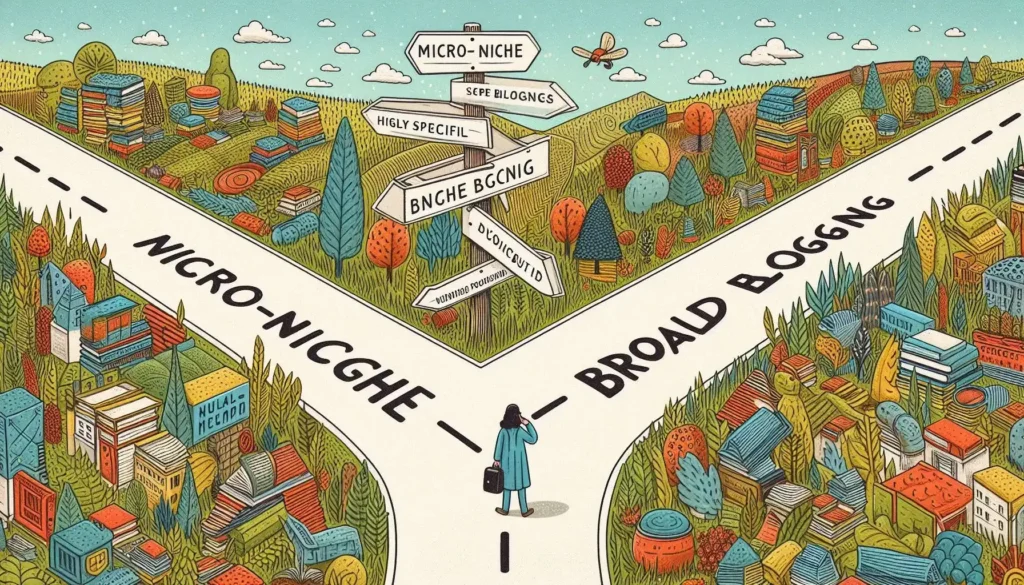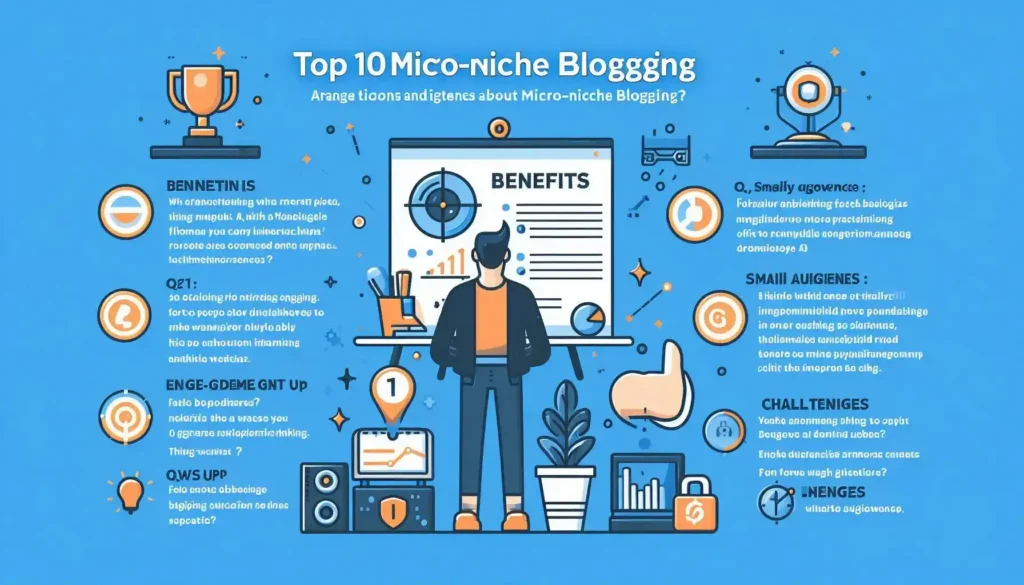Was there ever a time when you felt lost in the wide ocean of blogging? I have, too. I’m trying to make my voice heard among the noise. It was then that I found micro niche blogging, and it changed the game in the digital content space. If you’re looking to choose a blog niche, understanding micro niche blogging could be your key to success.
It’s not just about finding profitable blog niches; it’s about diving deep into a specific topic that evokes your passion. Before starting, it’s crucial to conduct thorough niche market research to ensure your chosen area has potential. It’s like a nook in the corner of a highly populated room where you shine. I followed thousands of blogs that earned massive amounts of income from tiny niches.
It’s not just about niching down when micro niche blogging; it really is being ultra-specific on a specific topic, tending to evoke your passion. Be it vintage typewriter restorations or vegan keto recipes for athletes—there is always a micro niche. What remains to be decided is if this will be the right move to make in your blogging journey.
In this article, I’ll guide you through all the pros and cons of micro niche blogging so that you know whether this will be your way to succeed in blogging.
We’ll speak about prospects for highly targeted growth, problems one might encounter, and how to tell whether this works for your goals. Let’s find out about micro niche blogging together.
What is micro niche blogging?
When you choose blog niche, micro niche blogging takes it a step further. It’s not just about selecting from a list of profitable blog niches, but rather identifying a highly specific subset within those niches.
Basically, micro niche blogging is a specialized approach wherein the topics are very narrow and highly specific to a segment of the audience. This hyper-focused strategy involves creating very specialized topics of blogs that cater to a very particular subset of a broader market.
characteristics of micro niche blogging
- Extreme specificity in topic selection
- Targeted content for a very particular audience
- In-depth coverage of specialized subjects
- Limited but highly engaged readership
If one has to succeed in this area, then micro-niche research becomes essential since it helps bloggers identify and understand their niche audience through proper niche audience analysis.

Example
- Gluten-free baking for high-altitude kitchen” instead of cooking blog.
- Strength training for over-60 female marathon runners instead of fitness blog.
- Solo female backpacking in Southeast Asian Buddhist temples instead of travel blog.
- Homeschooling gifted children with ADHD instead of just plain old parenting blog.
- A technology blog might drill down into restoring and updating vintage Apple products.
- Instead of the broad fashion blog, a micro-niche might focus on sustainable plus-size workwear for tech professionals.
- A gardening blog might narrow down to growing rare orchids in apartments.
These examples point out how micro niche blogs drill down to very granular topics where bloggers can develop niche expertise and attract a specialized, smaller following.
It enables bloggers to establish themselves as experts in focused, specialized areas and create very relevant content.
Pros of micro niche blogging
One advantage of micro niche blogging is the ability to dominate search results for specific long-tail keywords. This is why thorough niche market research is crucial before starting your blog.

Target Audience
What I find most interesting about micro niche blogging is that it allows me to connect with a highly focused audience. Instead of making attempts at casting such a wide net, it is speaking directly to those who have the same interest as me.
For example, in a study conducted by Technorati, 52% of bloggers who covered niche topics regarded their audiences as “like-minded peers.” That targeted approach enables me to build a loyal following who values my content fully.
Less Competition
The competition started falling off a cliff as I kept narrowing down. Kind of like wandering into a quiet corner in an otherwise very loud market. Sure, there are upwards of 600 million blogs globally. But guess what? Only a small fraction of them target ultra-specific niches. Meaning, I stand a fighting chance of being seen.
In fact, according to Long Tail Pro, niche websites can often rank for their target keywords within 3-6 months while generalist sites take a year or two.
Expertise development
By diving deep into my chosen micro-niche, I’ve become a true expert in my field. It’s amazing how much you can learn when you focus intensely on one area.
A survey by Orbit Media found that 65% of bloggers feel they’ve gained professional recognition through their blogs. In my case, this expertise has opened doors to speaking engagements and consulting opportunities.
Monetization potential
Well, this has proved possible, even with a small audience, because micro-niche blogs turn out to be amazingly profitable. Why? Because they attract engaged readers who, nearly all of them, are more disposed to spending money on specific solutions for their problems.
A report from BlogTyrant says niche blogs can earn between $500 and $10,000 a month. For me, targeted affiliate marketing and the creation of digital products that meet needs have really worked.
Cons of micro niche blogging
While micro-niches can be lucrative, they may not always align with the most profitable blog niches in terms of overall traffic. It’s important to balance passion with potential earnings when you choose blog niche.

Limited audience
However, upon starting my micro-niche blog, I quickly realized that I was dealing with an even smaller number of readers. This means that while my content is going deep with them, the numbers can sometimes be quite disheartening.
For example, even a general food blog could pull in millions of visitors per month, as compared with my “vegan keto recipes for endurance athletes” blog, which was way below that in regard to traffic. A study by Ahrefs has revealed that 90.63% of pages get no traffic from Google, and these are usually niche sites that fall into this category due to their topic specificity.
Content constraints
I find that writing about a micro-niche makes content creation feel like tightrope walking. It’s the very same focus that defines my blog that greatly limits what I can write about.
For example, after writing “10 Essential Vegan Keto Pre-Race Meals,” sometimes new ideas seem to be quite an uphill task. Based on an Orbit Media survey, 52% of bloggers find it difficult to produce consistent content, and this could be sometimes amplified in micro-niches.
Potential for burnout
It can be a mental drag to keep up with a micro-niche blog. I am frequently pushing myself further and further on issues of the same ultra-niche, which becomes squeezing water from a stone. One can easily get burnt out because pressure could escalate for consistently top-of-the-line content about a narrow topic.
In fact, a study by Blogtyrant stated that 29% of bloggers quit because of a lack of time or loss of interest—two very relevant problems for micro niche blogging.
Market saturation risk
One of my biggest fears is market saturation. The more people that learn about micro niche blogging, the more competition I foresee within my space. My niche might appear to be highly specialized, but it only takes a few viral posts before it becomes saturated.
Increased competition was one of the major challenges reported by 17% of bloggers in a GrowthBadger report. In the context of a micro-niche, even a small increase in competition can have a large impact on traffic and income.
Is micro niche blogging right for you?
Before deciding to enter a micro-niche, conduct comprehensive niche market research to ensure there’s a sustainable audience and monetization potential.
First and foremost, I find personal interest and expertise very critical to be assessed before venturing into micro niche blogging. I found that analyzing passions and areas of expertise might give a special intersection to help a blogger in his quest.

According to a ConvertKit survey, 33% of successful bloggers choose niches based on personal interest and expertise.
It has really been an eye-opener on how to view the potential of markets. I have been using tools like Google Trends and keyword research to see interest in my chosen micro-niche.
An Ahrefs study indicated that 94.3% of keywords get 10 or fewer monthly searches, so it is finding that golden middle road between specificity and demand.
Whenever I do decide on a micro-niche, though, I think about whether this will really fit my long-term goals. Will this topic enable me to keep interested for years to come? Can I see multiple revenue streams?
This way, according to Income School, it will take an average of 8 months for a new blog to start earning money, so I need to be prepared for the long haul.
Tips for successful micro niche blogging
Even within micro-niches, it’s possible to find profitable blog niches by identifying underserved segments of your audience. Continuously refine your approach as you choose blog niche topics for your content.
The most critical thing I have learned about micro niche blogging is that the secret behind it is in detailed research. The more inside the topic at hand I go, the more unique insights I have, and the more my content differentiates itself. Orbit Media says if you do original research, you are 2.9 times more likely to get strong results as a blogger.
Quality content is paramount. I give real attention to the production of in-depth and valuable posts that genuinely serve my audience’s needs. According to a HubSpot survey, 56% of bloggers who publish long-form content reported strong results, compared to only 31% of those who stick to shorter posts.

Knowing my niche inside and out has built relationships and created opportunities that may not have been foreseeable otherwise. Through social media and in-person events, I stay in touch with other bloggers and those experienced in my specialty area and my audience. According to Buffer, 66% of marketers see improved lead generation benefits with as little as 6 hours per week invested in social media marketing.
Because of this, I have been researching diversification techniques that would allow my micro-niche blog to be long-lasting. I keep my blog fresh and never tire my audience by pivoting to related sub-topics and other formats, like videos and podcasts. According to Statista, 55 percent of Internet users have listened to podcasts, thus showing another avenue to reach my audience.
FAQs

What is micro niche blogging?
I define micro niche blogging as focusing my content on a highly specific topic within a broader niche. For example, instead of blogging about “pets,” I might concentrate on “homemade diets for senior Chihuahuas.”
How do I choose a profitable micro-niche for my blog?
To select a profitable micro-niche, I research keyword volume, competition, and monetization potential. I look for topics with passionate audiences and low competition, then validate my idea through market analysis.
What are the main advantages of micro niche blogging?
The key benefits I’ve found in microniche blogging include easier audience targeting, reduced competition, increased authority in my specific field, and potentially higher conversion rates for affiliate marketing or product sales.
Can I make money from a micro-niche blog?
Yes, I can monetize my micro-niche blog through various methods like affiliate marketing, sponsored content, digital products, or consulting services tailored to my specific audience’s needs.
What are the potential drawbacks of micro niche blogging?
Some challenges I face with micro niche blogging are limited content ideas, smaller overall audience size, and the risk of my niche becoming obsolete. I also need to be cautious about pigeonholing myself too narrowly.
How often should I post on my micro-niche blog?
I aim for consistency rather than high frequency. Depending on my niche and audience, I might post 1-4 times per month, focusing on high-quality, in-depth content that truly serves my specific readers’ needs.
Is SEO different for micro-niche blogs compared to general blogs?
While I use many of the same SEO principles, I find that micro niche blogging allows me to target more specific long-tail keywords with less competition. I also focus heavily on building topical authority within my narrow niche.
How do I expand my micro-niche blog without losing focus?
To grow my micro-niche blog, I carefully expand into closely related subtopics, always ensuring new content aligns with my core audience’s interests. I might also explore different content formats like videos or podcasts within my niche.
What skills do I need to succeed in micro niche blogging?
To excel in micro niche blogging, I cultivate deep subject matter expertise, strong research skills, and the ability to create engaging, unique content consistently. I also develop basic SEO and digital marketing skills to promote my blog effectively.
How do I know if micro niche blogging is right for me?
I consider micro niche blogging if I have a passion for a specific topic, enjoy creating detailed content, and prefer a focused approach to blogging. I assess my goals, expertise, and target audience to determine if this specialized strategy aligns with my blogging objectives.
At The End:
Through our discussions, we learned that micro niche blogging can provide one with the opportunity to uniquely carve a space in the digital world. The path can lead deep connections with your audience and firmly establish one as an expert in your craft, perhaps unleashing further profitable opportunities. None of this will be easy—from limitations on what content to write to the potential saturation of the market.
Ultimately, micro niche blogging is going to require you to decide based on your interests, areas of expertise, and long-term goals. If you are willing to really dive deep into a subject matter and build a tightly-knit community around it, then micro niche blogging may be the answer to making your blog stand out amidst the crowded blogosphere.
Success in micro niche blogging will be directly proportional to real enthusiasm, high-quality content creation on a regular basis, and the willingness to adjust as things go forward. Move niche or stay broad; what matters most is to get started and out into the world with your unique voice. Your perfect audience is somewhere out there, looking to discover your content.

